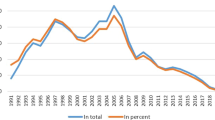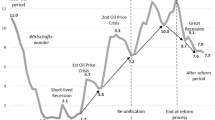Abstract
The aim of this paper is to analyze the causes of the rapid wage equalization between eastern and western Germany following in the first years after economic unification in 1990. The paper is divided into four parts. In Part 1, we summarize the basic facts of the eastern German labor market after economic unification as far as they are relevant for the purpose at hand. In Part 2, we recapitulate the causes of the sharp rise of unemployment in eastern Germany after unification. In Part 3, we turn to the reasons for East/West-wage equalization. We evaluate a few different theories, which have been advanced to explain the observed rapid rise of the eastern real wage level in the face of drastically increasing unemployment. In particular, we discuss whether the observed facts should be seen as the logical consequence of historically unique economic circumstances (e.g., due to the high East/West-mobility of the labor force or to the end-game characteristics of eastern German wage bargaining), or whether they are better viewed as the ‘natural’ outcome of German-style corporatism. In Part 4, we evaluate some normative economic arguments that have been advanced in favor of a rapid East/West-wage equalization. Particular emphasis is put on matters of interregional mobility, human capital accumulation, and the path of structural change.
Access this chapter
Tax calculation will be finalised at checkout
Purchases are for personal use only
Preview
Unable to display preview. Download preview PDF.
Similar content being viewed by others
References
Akerlof, G. et al. (1991), East Germany in from the cold: the economic aftermath of currency union, Brookings Papers on Economic Activity 1, 1–87.
Barro, R./ Sala-i-Martin, X. (1995), Economic Growth, New York.
Burda, M. (1991), Labor and Product Markets in Czechoslovakia and the Ex-GDR: a Twin Study, in: Directorate General for Economic and Financial Affairs (ed.), The Path of the Reform in Central and Eastern Europe, Commission of the European Communities Luxembourg, 111–128.
Burda, M./ Wyplosz, C. (1992), Labor Mobility and German Integration: Some Vignettes, in: Siebert, H. (ed.), The Transformation of Socialist Economies, Tübingen, 333–359.
Burda, M./ Funke, M. (1993), German Trade Unions after Unification: Third Degree Wage Discriminating Monopolists?, Weltwirtschaftliches-Archis 129(3), 537–560.
Burda, M. (1998), Semiparametric Analysis of German East-West Migration Intentions: Facts and Theory, Journal of Applied Econometrics, 13, 525–541.
Burda, M./ Funke, M. (2000), Wages and Structural Adjustment in the New German States, in: R. T. Riphahn/ D. Snower/ K. F. Zimmermann (ed.), Employment Policy in Transition: The Lessons of German Integration for the German Labor Market, Heidelberg, 31–51
Chadha, B. (1991), Wages, Profitability, and Growth in a Small Open Economy, IMF Staff Paper 38, 59–82.
Deutsches Institut für Wirtschaftsforschung, Berlin/Institut für Weltwirtschaft, Kiel (1993), Gesamtwirtschaftliche und unternehmerische Anpassungsprozesse in Ostdeutschland, Achter Bericht, Kiel Discussion Papers 205/206.
DIW et al. (1999), Gesamtwirtschaftliche und unternehmerische Anpassungsfortschritte in Ostdeutschland, Neunzehnter Bericht, Kiel Discussion Paper 346/347, Kiel Institute of World Economics, Kiel.
Donges, J. et al. (1988), Mehr Strukturwandel für Wachstum und Beschäftigung. Die deutsche Wirtschaft im Anpassungsstau, Tübingen.
Farber, H. (1986), The Analysis of Union Behaviour, in: Ashenfelter, O./ Layard, R. (eds.), Handbook of Labor Economics, Vol. 2, Amsterdam, 1039–1089.
Fink, U. (1992), Aufschwung durch Arbeitnehmer-Kapital, in: Die Zeit, May 8, 1992.
Fischer, B./ Spinanger, D. (1986), Factor Market Distortions and Export Performance: an Eclectic Review of the Evidence, Kiel Working Papers 259.
Giersch, H. et al. (1992), The Fading Miracle, Four Decades of Market Economy, Cambridge.
Hemmer, H./ Schmitz, K. (eds.) (1990), Geschichte der Gewerkschaften in der Bundesrepublik Deutschland: Von den Anfängen bis heute, Köln.
Lange, T./ Pagh, G. (1998), The Economics of German Unification, Chelthenham.
Lawrence, C./ Lawrence, R. (1985), Manufacturing Wage Dispersion: an End Game Interpretation, Brookings Papers on Economic Activity 1, 47–106.
Lewis, G. (1986), Union Relative Wage Effects, in: Ashenfelter, O./ Layard, R. (eds.), Handbook of Labor Economics, Vol. 2, Amsterdam, 1139–1181.
Lucas, R. (1988), On the mechanics of economic development, Journal of Monetary Economics, Vol. 14, 3–42.
Meckl, J. (1992), Lohnpolitik und innerdeutsche Arbeitskräftewanderung. The Influence of Politically Determined Wage Rates on Migration Between Germany’s New and Old States, Jahrbücher für Natio alökonomie und Statistik 209, 407–418.
Paqué, K.-H. (1991), Structural Wage Rigidity in West Germany 1950–89. Some New Econometric Evidence, Kiel Working Papers 489.
Paqué, K.-H. (1992), Comment on Michael C. Burda and Charles Wyplosz, Labor Mobility and German Integration: Some Vignettes, in: Siebert, H. (ed.), The Transformation of Socialist Economies, Tübingen, 365–367.
Rawls, J. (1971), A Theory of Justice, Cambridge, Mass.
Sachverständigenrat zur Begutachtung der gesamtwirtschaftlichen Entwicklung, Annual Reports (various issues), Stuttgart.
Sachverständigenrat zur Begutachtung der gesamtwirtschaftlichen Entwicklung (1997), Jahresgutachten 1997/98: Wachstum, Beschäftigung und Währungsunion — Orientierungen für die Zukunft, Stuttgart.
Siebert, H. (1992), Das Wagnis der Einheit: Eine wirtschaftspolitische Therapie, Stuttgart.
Sinn, G./ Sinn H. (1992), Jumpstart — The Economic Unification of Germany, Cambridge.
Suhr, W. (1989), Singapurs Rezession 1985: Resultat eines lohnpolitischen Experiments?, Kiel Working Papers 391.
Author information
Authors and Affiliations
Editor information
Editors and Affiliations
Rights and permissions
Copyright information
© 2001 Springer-Verlag · Berlin Heidelberg
About this chapter
Cite this chapter
Paqué, KH. (2001). East/West-Wage Rigidity in United Germany. In: Riphahn, R.T., Snower, D.J., Zimmermann, K.F. (eds) Employment Policy in Transition. Springer, Berlin, Heidelberg. https://doi.org/10.1007/978-3-642-56560-1_4
Download citation
DOI: https://doi.org/10.1007/978-3-642-56560-1_4
Publisher Name: Springer, Berlin, Heidelberg
Print ISBN: 978-3-540-41166-6
Online ISBN: 978-3-642-56560-1
eBook Packages: Springer Book Archive




